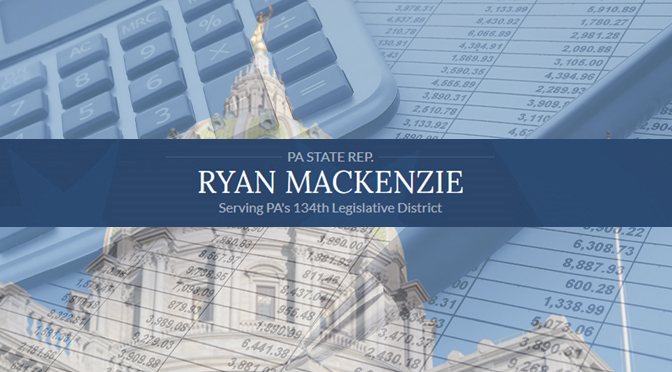|
|
HARRISBURG – Rep. Ryan Mackenzie (R-Berks/Lehigh) joined a bipartisan majority of his House colleagues in passing the 2022-23 state budget bill this week. The $42.8 billion spending plan increases education funding to an all-time high while making a sizable deposit into Pennsylvania’s Rainy Day Fund without raising taxes.
“Not only are there no new taxes – there are tax cuts for small businesses and families,” said Mackenzie. “This proposal adds $2.1 billion to the Rainy Day Fund, bringing the total to an historic $5 billion, and also pays back over $2 billion worth of prior budget borrowing. Both are sound investments that will put the Commonwealth on firmer financial ground and help offset the impact of future economic downturns.”
The budget bill provides relief for small business owners in the form of expense deductions that encourage equipment purchases and expansion. They can also defer tax liabilities on gains from similar property exchanges, as allowed in every other state.
Families will benefit as well, according to Mackenzie. The proposal creates a first-ever childcare credit equal to 30% of the federal credit.
Mackenzie also noted that Pennsylvania’s public, charter, and private schools will share a largest-ever allocation of $15 billion for PreK-12 education.
“This includes a $525 million increase in basic education funding ($7 billion), $100 million more for special education ($1.3 billion), $100 million for school safety and security, and a $60 million increase in Pre-K Counts,” he said.
School districts within the 134th Legislative District will receive the following amounts of basic education funding:
- Brandywine Heights Area – $4.6 million, a funding increase of $211,836 (4.5%).
- East Penn – $15.4 million, a funding increase of $2 million (13.4 %).
- Fleetwood Area – $6.5 million, a funding increase of $186,910 (2.8%).
- Parkland – $11.9 million, a funding increase of $2.2 million (18.6%).
- Salisbury Township – $3.1 million, a funding increase of $402,260 (12.7%).
- Upper Perkiomen – $9.7 million, a funding increase of $403,589 (4.1%).
In addition, the budget includes $250 million in federal relief funds for long-term care providers that have struggled during the pandemic. The allocation will help them with continued costs related to COVID-19 and worker retention. Also contained in the plan is funding for services for more than 800 additional individuals with intellectual disabilities.
Finally, funding was included that will allow the Pennsylvania State Police to train 200 additional troopers for the protection of communities statewide.
The spending plan (Senate Bill 1100) was signed into law by Gov. Tom Wolf on Friday.
Additional information about the 2022-23 state budget is available at www.pahousegop.com/statebudget
Information provided to TVL by:
Andy Briggs
Representative Ryan Mackenzie
134th District
Pennsylvania House of Representatives
http://www.repmackenzie.com/







